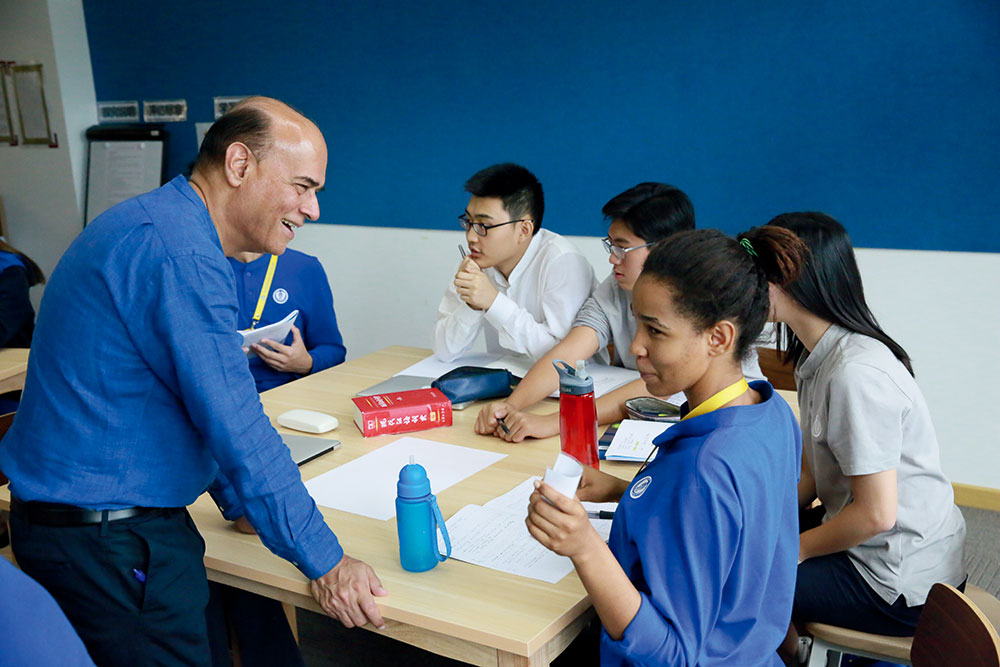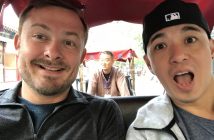Vivek Bammi, Theory of Knowledge teacher at Keystone Academy, teaches his bilingual International Baccalaureate course with a Chinese co-teacher, enabling him and his students to witness the Chinese love of deep learning in a global context. Fueled by a desire for fresh challenges and a fascination for Chinese history and culture, Bammi came here two years ago from Indonesia, where he taught at an international school for over 25 years. Although Bammi enjoyed a comfortable lifestyle as a child in East India’s Assam, where his father worked as a manager of a tea plantation, he did not follow his father’s footsteps, but was led to academia by his love for learning. Since then, he has never regretted his decision, but enjoys teaching the subjects he loves most: the humanities—history, geography, literature, and the arts—for the rich, multi-dimensional perspectives the subjects offer into the human experience

How would you (or your students) describe your teaching style?
My teaching style reflects my passion and enthusiasm for lifelong learning: I want to engage the students in an active exploration and discussion of ideas and issues that are shaping their world. Ultimately, the teacher must hand over the control of learning to the students, so that they can move away from ‘traditional’ and ‘out-dated’ models of thinking.
What are some of the topics you cover?
I cover different topics of world history, including aspects of social (such as family, food, sports) and aesthetic (music, film, art) history, since every individual is constructed by multiple influences. In Theory of Knowledge, we focus on contemporary issues which are often contestable and exciting, such as plastic surgery, cloning, genetic engineering, abortion, preserving or discarding cultural practices, consumerism, gender orientation, and equality.
What topic was the most challenging to cover with children? Why?
In my subject area, we cover many topics with multiple perspectives, which often challenge the students to re-examine their own viewpoints and opinions and to consider alternative ways of thinking and reasoning. This can be upsetting for young adults; it is also difficult to convey uncertainty and ambiguity in knowledge, since much of school education is predicated on the opposite.
What topic was the most interesting to your students? Why?
Paradoxically, the topics that are the most challenging (involving different perspectives and examining contemporary issues) are also the most interesting for most students! Many let me know that the active interaction and discussion with their peers helped to clarify their own thinking and stance. The teenage years are fluid, and an active engagement in the classroom begins to shape an identity (or identities) which they can further explore in the wider world.
What class project in your teaching career was the most meaningful to you?
I taught a course in anthropology in Indonesia; after studying the concept of “culture” in some depth, we organized a field trip to Central Java, which included a range of activities: a paleontological ‘dig’ at the site where “Java Man” was discovered, and visits to a Javanese village, an art school, the Palace, and a museum of “batik” cloth. This kind of “experiential learning” is very meaningful, and changed many students’ perspectives: most of them were international and tended to have a superficial view of Indonesian society based on their narrowed world view. After this experience, they began to appreciate the depth and beauty of Indonesian culture, its tolerance and acceptance of others, the kindness and mellow temperament of its people. This experience was transformative for me as well, and Indonesia is my favorite land in the world!
This article originally appeared on page 38 of the November/ December issue of beijingkids magazine. Click here for your free online copy. To find out how you can obtain a hard copy, contact distribution@truerun.com.
PHOTOS: UNI YOU, COURTESY OF KEYSTONE ACADEMY




